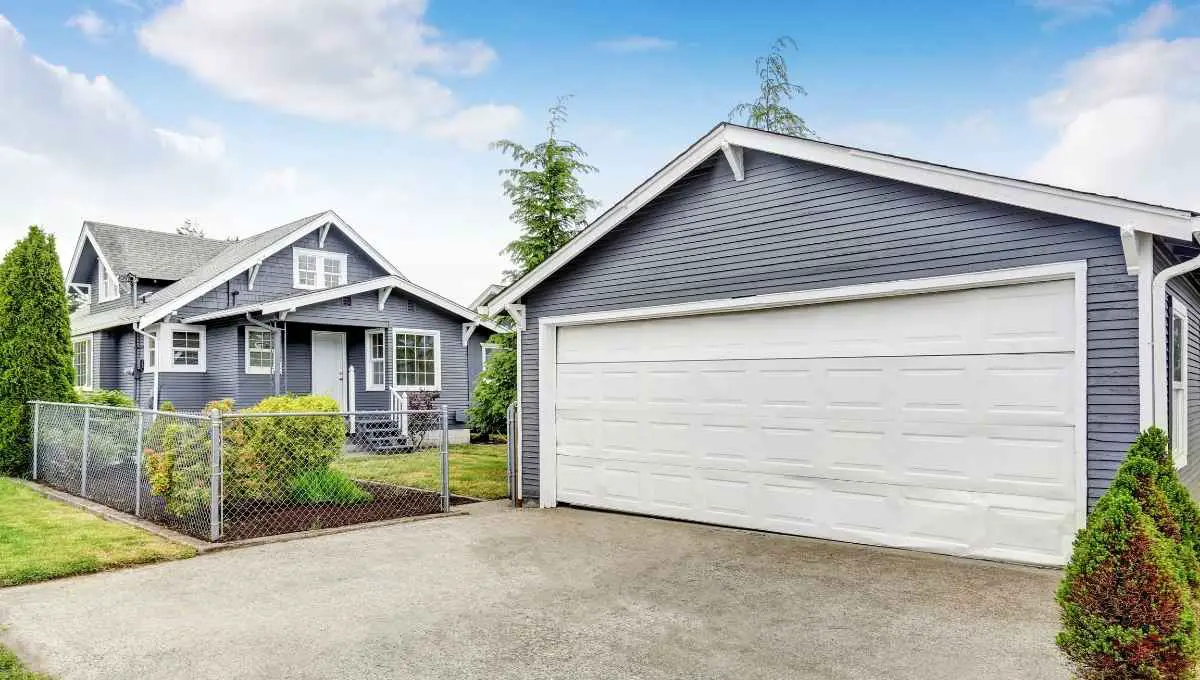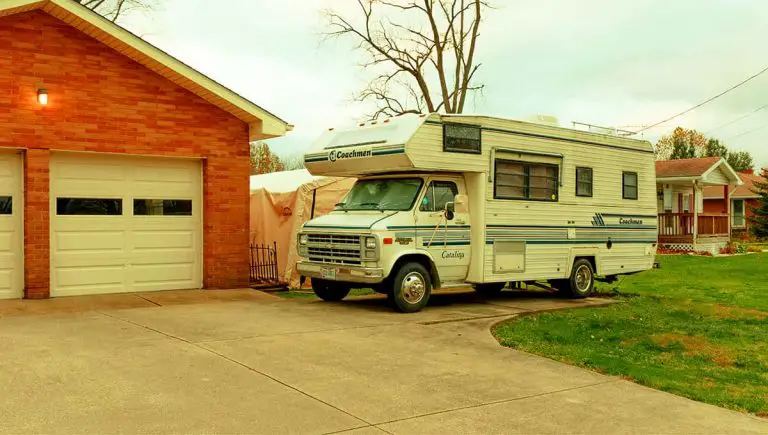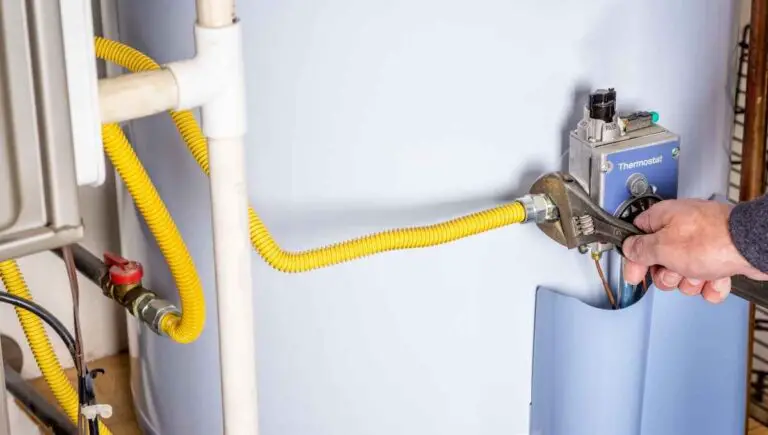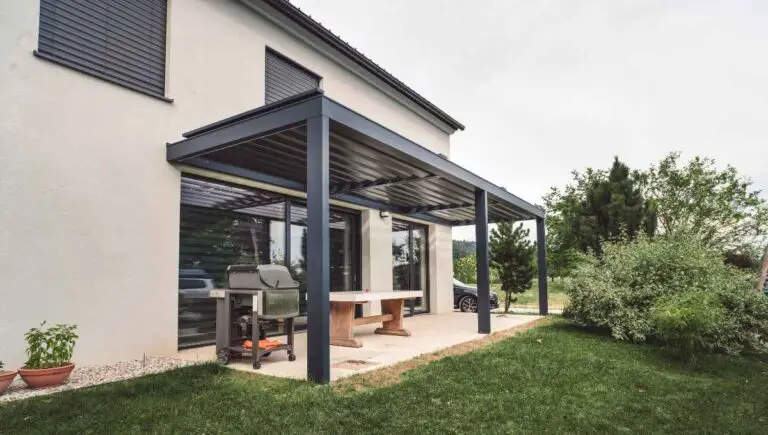How Close to the Property Line Can I Build a Garage?

It happens all the time. You buy a house, grab some DIY tools and a lawnmower, and you’re out of space to store everything before you know it. So, it’s time to build a garage! But, how close to the property line can you build a garage?
Each city has its own laws and ordinances regarding how close to a property line you can build. A good rule of thumb is to keep at least five to ten feet from your property line. Check your local and state laws for exact measurements and permit requirements.
Knowing to check property laws is one thing, but building a garage can bring up many other questions. So, to simplify, we’ve pulled together some of the most common questions surrounding the building of a garage. Enjoy!
This post contains affiliate links from Amazon and other stores. This means Yard Blogger may earn a commission if you make a purchase using any of our links. Please refer to our full affiliate disclosure policy for full details.
Here’s a Quick Pro Tip!
Typically, you can build a garage beside a side property line as long as you leave 3 feet of space. But, this can vary.
However, once you have the logistics sorted out, you are free to start building! Now, you will need to make sure you have the best tools to make the job easier.
Here are some recommended tools for building a garage:
1. Hammer – Because every tool man/woman needs a hammer in their tool belt!
2. Carrhart Tool Belt – Speaking of tool belts, this one’s pretty epic
3. Carpenter Square– To make sure your angles are perfect!
Where Should I Build a Garage?
Building a garage can come with a lot of questions and concerns. You know you want to build a shelter for your things, but you don’t want to break the rules! So first, let’s break down some common questions regarding garages and boundaries.
Can I Build a Garage on My Boundary Line?
Typically, a local law states how close you can build to your property line. Check your local zoning laws on boundary lines for complete rules. In most cities, you must be at least five or more feet away from your property line when building a new structure.
Regardless of the legality, it’s not the greatest idea to build a garage directly on your boundary line, but there are no setback garages for a reason.
This can be a great option if you’re running out of space. Consider where you’re going to build before making any final decisions.
How Close Can I Build a Garage Next to My Neighbor’s Boundary?
All parts of the garage need to reside on your property. Five or more feet away from the property line is fairly standard. However, if you accidentally go over, your neighbors may have the right to remove or modify your garage, so be careful!
If you are unsure of your boundary lines, check your title and deed for information on your property lines. You can also check any existing surveys done to the property to ensure you are not accidentally going over to your neighbor’s yard.
Can You Build a Garage Right up to the Boundary?
If you’re running out of space, you may be considering building your new garage right next to the boundary lines. While this may be a space saver, you’ve got to be careful you’re not going outside of your boundary.
Most cities will require at least five feet between a structure and the boundary lines.
You may want to check your county and state ordinances to see if there are any specific regulations for zoning and boundary lines. For example, in Dubuque, Iowa, a detached garage must be at least six feet from a property line!
Is There a Minimum Distance Between a House and a Garage?
A great rule of thumb regarding the minimum distance between a house and a garage is to get at least five to fifteen feet from your house. This is the law for most places, but it’s always wise to check with your local zoning board for the specifics in your area.
Assuming you are building a detached garage, there must be some distance between your house and the garage. How much depends on many factors, including space, other outside decor and landscaping, and where the driveway lies.
You might also enjoy our post on If You Need a Permit to Build a Shed
How Close to the Property Line Can I Build a Garage?
In most cities, your structure should be at least five feet or more from a property line. You most likely want to keep your structure close to the property line, so you don’t take up valuable space close to the house.
That makes perfect sense! Consider building your garage close to a corner of your property. This saves space and will look aesthetically pleasing.
You don’t want to build your garage too close to a property line for a variety of reasons. Check your county’s ordinances for any regulations on how close you can legally build and see what (if any) permits you may require to build your garage.
Following Regulations While Building
Now that you’ve decided to build a garage and know where you want to put it, be sure you’re aware of the local rules and regulations surrounding detached garages.
What Is the Building Code for a Detached Garage?
You can find your cities building code by contacting your local government offices. There will typically be a large number of requirements to keep your building to code.
Some common requirements include:
- Length, width and height of the walls, floor, and roof
- The necessity of specific building materials.
St. Paul, Minnesota, has a two-page sheet for the requirements for the construction of a detached garage, complete with a diagram!
No matter where you’re building, failure to follow a city building code can result in fines and even the possibility of your property being condemned.
Obviously, this would be terrible, so be sure you’ve got your ducks in a row before building!
Is a Garage Considered a Detached Residential Accessory?
A garage is typically considered a detached residential accessory. Detached residential accessories are any freestanding structure on a property that is not the largest structure (basically everything with a roof that’s not your house!)
Typically, your house will be considered the main structure of your parcel of land.
FEMA also considers the following detached residential accessories:
- Gazebos
- Picnic pavilions
- Boathouses
- Small pole barns
- Storage sheds
Where Do I Find My Property Lines?
There are several great ways to find your property lines. You can find the lines in your title. If you cannot access your title, you can also find it by contacting your realtor or having a land survey completed.
It’s important to know exactly where your property lines are so you do not accidentally build too close to the edge of your property.
Also, you don’t want to pour a lot of time and money into a project only to find out it’s not up to code or on the neighbor’s property!
You might also enjoy our post on How Close a Driveway Can Be to a Property Line
Where Do I Find My Title and Deed?
You should have received a copy of both your title and deed when you bought your home. If you do not have them, you can request a copy from the realtor that brokered your sale.
The government will also have a copy because titles and deeds are legal documents. This means you can also contact your local recorder or property records office for a copy of your title and deed if needed.
How Do I Get My Land Surveyed?
You will want to contact a licensed land surveyor to perform the survey. Be sure to check their licensing before accepting an offer.
Surveying can cost between $200 and $1,000 depending on where you live, so be sure to shop around before making a final decision on your surveyor!
Once you have an appointment for the survey, the surveyor will come to your property and measure your land to establish the boundaries of the land.
This will be crucial to decide where best to legally build your new garage.
What Is a Setback?
A property setback is a requirement that informs a property owner where they cannot build. There is a variety of reasons for a setback, especially when you are building a new structure on your land.
Some of the most important reasons for a setback are:
- Safety – Typically, a setback is set up to prevent damages during an emergency. The further your garage is from your house, the less likely it is that debris from the garage will hit the home in a storm.
- Noise – When your garage is setback away from your house and other homes, it can work as a sound barrier to prevent noise pollution from hitting your house.
- Access – It is essential that emergency services and utility workers can access your property if needed. A setback may be set to ensure that these workers can reach your property.
What Is an Easement?
An easement is a written agreement that allows other parties to utilize a tract of land to reach their property. Commonly called right-of-way easements, they are typically found with a title or deed and transferred with the property rights.
If you happen to live next to state-owned land, you may be part of an easement agreement with the government. Often time states use easements to protect natural resources, and this particular example comes from New York.
What Is a Quitclaim Deed?
A quitclaim deed is used when ownership of a house is transferred without money changing hands. Typically, you see quitclaim deeds utilized when family members are gifting land to someone in the family.
Quitclaims are unique because of the lack of money changing hands, because no title search will be completed, and because no insurance is issued.
They work well for transferring lands in a family, but be cautious using one because they cannot be used for sales, as the new owner can’t guarantee that their new title is valid due to the lack of a title search.
Do I Need a Permit to Build a Garage?
The best course of action is to check your local ordinances for building. In most cities, you need a permit to build a freestanding structure such as a garage. Your new building must conform to local zoning laws.
Suppose your local municipality requires a permit before building a new structure on your property, and they find out you built something without getting those permits.
In that case, you could be in for a hefty fine, and they could potentially stop you from completing your project.
Which Permits Do I Need to Build a Garage?
Your local government office can advise you on what specific permits you need to build a garage, but typically, you will need zoning permissions.
Additionally, they may require you’ve had a land survey done to ensure you are not building on any utility sites or blocking emergency or utility services from reaching you or your neighbors.
In the Bronx, Brooklyn, Staten Island, and Queens, they have a formal application you can use to apply for a permit to build your detached garage. This form covers all definitions and zoning codes.
Check with your local building codes for their version!
You might also enjoy our post on If You Need a Permit to Run a Gas Line
What Will Happen if I Don’t Receive a Building Permit?
You may receive a stop-work notice and a sizable fine if you start a building project without receiving the proper permits required by your local laws.
It’s always wise to ensure you’re following the rules before you start to avoid an enormous headache partway through!
You may think you’ll get away with building a structure without permits, but those are designed to keep you safe as well!
Getting the permits also ensures you’re not building in a spot you don’t realize is dangerous or in a site that covers underground utilities or other important features.
Considering Your Neighbor’s in the Building Process
Informing your neighbors there’s going to be a long, loud build happening right next to them may sound about as fun as a root canal, but not informing them could be even worse.
Here are some tips and tricks for dealing with neighbors while you’re building a new garage.
Should I Tell My Neighbors I Am Building a Garage?
It’s considered best practice to inform your neighbors if a noisy project is about to start. While it’s not legally required, notifying your neighbors before the building starts may prevent tensions from developing.
Also, if your neighbor is the complaining type, letting them know in advance that you’ve talked to the zoning board and have all proper permits may prevent a headache in your future.
After all, you’ve got the right to build on your own property.
Do I Need My Neighbor’s Permission to Build a Garage?
If you have the legal rights to build a garage on your own property, your neighbors have no legal way to prevent you from doing so. However, you also don’t want to start a feud with your neighbor accidentally.
It’s common courtesy to inform your neighbors of any big projects on your property. This can give them time to prepare for any changes that may come with your new garage.
For example, suppose you are going to need heavy machinery access. In that case, you might have to ask them for permission to park your vehicle on their property or in front of their house while you’re building.
Remember, it’s better to have asked first instead of assuming.
What if My Neighbors Don’t Want Me to Build a Garage?
If your neighbors don’t want you to build a garage, they may complain and try to prevent you from completing the job. However, as long as you received the proper build permits and are not straying onto their property, they cannot legally stop you from completing it.
This is one of the reasons why you want to discuss the build with them before starting.
They may not like that you’re doing it, but at least they’ll know you respected them enough to inform them before you started, and that can go a long way towards keeping peace in the neighborhood.
You might also enjoy our post on If You Need a Permit to Build a Treehouse
Related Questions
We’ve discussed the legalities and best practices for building a new garage, as well as how to deal with a conflict with the neighbors, but you might still have some questions.
What Can I Do if My Neighbor Is Building a Huge Garage Too Close to Our Property Line?
A new building process can be daunting, and if you’re not the one doing the construction, you might be irritated at the noise and mess happening at all hours of the day.
If your neighbor’s new garage is boarding on your property line, be sure to check the local laws regarding property lines.
Your neighbor has the right to build on their land (assuming they filed all necessary paperwork), but they do not have the right to encroach on your property.
Your local ordinances will tell you how close is too close, and if they’ve crossed the line, you have the right to inform them of the error and request a change of build site.
Can I Stop My Neighbor From Building a Garage Right Next to Our House?
As long as your neighbor is building their garage on their property, and as long as they have completed all necessary permit paperwork, they have the legal right to build a garage on their property, even if that property borders yours.
Hopefully, they discussed their build plans with you before it started. If not, you can ask to see their plans and follow up with the local zoning laws to ensure they are not breaking any rules or regulations regarding building a structure.
Final Thoughts
Building a new garage can be a daunting but exciting prospect. Be sure that you’ve checked all local and state laws to ensure you are building in an approved location before breaking ground.
It’s also a good idea to inform neighbors of the work before it starts to help keep peace in the neighborhood.
Hopefully, your new garage will add value to your property and be a valuable building for years to come. Good luck, and enjoy your new garage!






